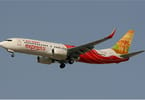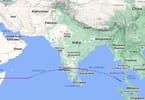(eTN) – In less than a month, we are entering the customary two-month long school holiday season in India. Yet there is no end to the troubles facing cash-strapped Kingfisher Airlines (KF). Less than ten days ago, the income tax authorities decided to freeze its accounts; a couple of days ago it was the turn of yet another tax authority to freeze the account. All in all, passengers of Kingfisher Airlines have had to undergo many hardships over the past month, with flight cancellations and delays, not knowing for sure whether his/her flight would take off. Needless to say, involuntary changes in flight plans puts tremendous pressure, causes untold hardships, and unnecessary expenses arising out of rebooking, transportation, and hotel expenses to hapless flyers.
With more than half its fleet grounded due to non-availability of spares, KF has trimmed its operations by 50 percent. Staff not being paid salaries for a couple of months doesn’t do much to solve a crisis, which threatens to blow out of proportion, unless drastic measures are immediately taken. Simply put, it means the promoter must put in a huge chunk of his own capital, after which the airline will be backed by lenders, who will in all probability dole out an identical amount. With debts and losses running into thousands of crores of rupees, the question being asked is whether the promoters themselves are confident of turning this loss-making airline into a profitable model over the next year or so.
The market share of KF now stands at a dismal five out of the six domestic-scheduled airlines operating in India; the top three slots now belong to Jet Airways, Indigo, and Air India. Until six months ago, KF held the number two spot. It’s too complicated to delve into the reasons why this airline couldn’t meet the challenges and trim its losses, which have been accumulating for a long time.
Mismanagement is being cited as a major reason, followed by unrealistically low airfares, high fuel prices, high turnaround costs at airports, and not being in sync with understanding pragmatic realities of a challenging business that is all “gloss from outside.”
Where does KF go from here, or what are the alternatives available before the summer rush begins? Should the promoters not contribute their share, most would believe that there is a lack of self belief in airlines’ growth trajectory and profitability. The second option is left with the banks to convert debt into equity and bring in experts and professionals to run the beleaguered airline. Financial institutions would take a heavy beating, considering share prices of KF have fallen by as much as 75 percent over the past year. It would be a long drawn-out process, with these institutions willing to patiently harbor the airline back to its feet. The last option left is for the promoter to sell its equity to another cash-rich airline, exit the business, and let the new owner take over the reins. Obviously, the new owner will take over debt as well, which stands at a staggering 70,000 million rupees, and must be cash rich and more than willing to nurse the airline back to health.
Not surprisingly, domestic airfares have gone up by 18 percent over the past couple of months; competitors have been quick to rise to the occasion and are beginning to charge realistic fares that should have been charged from day one. Flights are still going full, and in all probability, it could mean a turnaround in profits for these airlines, as compared to losses over the past two quarters. Consciously or unconsciously, cartelization would return back to domestic airlines, an almost similar scenario being witnessed in international skies.
Close to fifteen years ago, four airlines set up shop and started flying operations across India; Indian Airlines was in business since 1950 and was the leader. Within a space of four years, three airlines, namely NEPC, Modi Luft, and East West, quietly down-sized their operations and closed shop. Jet Airways weathered the storm because of its single-minded professional approach and became the market leader. Indian Airlines fell to the number two position.
The equation changed in the mid 2000s, when all of sudden, low-cost carriers arrived on the scene, giving the two major players a run for their money. Kingfisher made its entry as a full-service carrier; somewhere along the line, it acquired a low-cost carrier for an astronomical sum, that didn’t do much justice to either its schedule or its balance sheet. Post 2005 until today, it’s been a humungous challenge for airlines to stay afloat with the exception of a couple of really well-managed ones, like Indigo for one. Will history repeat itself or will “deemed” cartelization ensure profits for all?
Looking ahead, someone needs to bite the bullet at/for Kingfisher, and it needs to be done soon to safeguard the interests of passengers. If not in a philosophical state of mind, I am content to see the blue-breasted Kingfisher bird perched on an overhanging branch overlooking a fast-flowing stream in quiet sobriety rather than actually flying on a turbulent aircraft of the same name. Many echo a similar feeling, and they aren’t entirely wrong in doing so.
WHAT TO TAKE AWAY FROM THIS ARTICLE:
- Simply put, it means the promoter must put in a huge chunk of his own capital, after which the airline will be backed by lenders, who will in all probability dole out an identical amount.
- With debts and losses running into thousands of crores of rupees, the question being asked is whether the promoters themselves are confident of turning this loss-making airline into a profitable model over the next year or so.
- Obviously, the new owner will take over debt as well, which stands at a staggering 70,000 million rupees, and must be cash rich and more than willing to nurse the airline back to health.




















![China's Hyperloop Train: A Glimpse into the Future of Transportation 18 Travel Tourism News | Domestic & International Hyperloop Train China [Photo: Hyperloop Transportation Technologies]](/cdn-cgi/image/width=145,height=100,fit=crop,quality=80,format=auto,onerror=redirect,metadata=none/wp-content/uploads/2024/02/180720163348-hyperlooptt-china-capsule.jpg)

